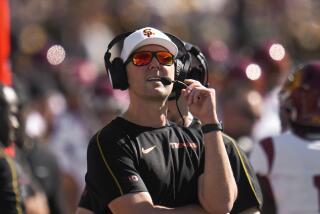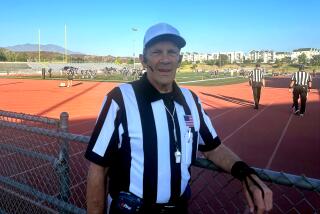Itâs official: Refs out of their depth
Imagine cruising along the freeway at 55 mph and being suddenly transported into the middle of a NASCAR race, surrounded on all sides by world-class drivers racing powerful machines at top speed.
That, according to one Pac-12 Conference football official, is similar to what the NFLâs replacement referees have experienced in recent weeks.
âItâs not that easy,â said Steve Strimling. âNot everyone can do this.â
The inadequacies of the replacement referees was crystallized Monday night, when Seattle threw a game-winning up-for-grabs pass that was intercepted but ruled a catch, giving the Seahawks a controversial 14-12 win against the Green Bay Packers.
The NFL reaffirmed the ruling Tuesday, even as an intense uproar among players and fans grew to a boil regarding a play that was ruled on by a former Division III football referee.
âI think all of officiating knew that it was going to take a play like this to really wake everybody up,â said Rich Kollen, a retired Division I referee who coordinates football officials for about three dozen community colleges in Southern California.
Lance Easley is the side judge who ruled a âsimultaneous catchâ between Seattle receiver Golden Tate and Packers safety M.D. Jennings, who appeared to have possession of the ball when both players hit the ground. Another official initially ruled the play as an interception and touchback.
Both officials missed Tate shoving a defender out of the way as the pass came toward them, which should have resulted in a penalty for offensive pass interference.
The NFL requires its permanent officials to have at least 10 yearsâ experience, including at least five in major-college football. Easley, the least experienced of the Monday night crew, had four years of experience, none above Division III.
In fact, last summer Easley was deemed not ready to officiate at the Division I level, according to Karl Richins, who made the determination along with his staff at the Stars and Stripes Academy for Football Officials in Salt Lake City.
Easley, a Santa Maria resident, is among several referees who went from officiating small-college games to the NFL, which locked out its officials in June after their contract expired. Whereas seven-member NFL officiating crews by policy include no more than one rookie, the replacement crews are all rookies.
âYou can imagine how theyâre feeling as a whole,â said Bill McCabe, whose experience includes three decades officiating football in the Western Athletic and Mountain West conferences.
âThey wanted to do it because they knew theyâd never get [another] chance, and now Iâm sure theyâre thinking, âBoy, Iâm not sure I would ever do this again.ââ
Across the officiating community Tuesday, there was embarrassment and frustration.
âWhen you see this, then people have a tendency to question other officials, in the small-college game or wherever,â said Mike Burton, commissioner for the Northwest Intercollegiate Football Officials Assn. for Division II and III schools.
Said McCabe: âItâs affected all of officiating. ... Itâs sad.â
Several longtime college officials described the lengthy and tedious process it takes to rise through the officiating ranks, from working high schools to community colleges, then up through the four-year college divisions and to the professional level.
Strimling said itâs not unusual for officials to spend a year or two attending spring practices and scrimmages before being allowed to officiate a small-college game.
âThereâs things theyâve called and mistakes they made, and when you get to the NFL level youâve already made those mistakes,â Strimling said.
Several top-level Bowl Championship Series conferences restricted their referees from becoming replacements in the NFL, which meant the league had to pull from the lower levels, such as Division II, Division III and the Lingerie Football League.
Compared to other echelons of football, the NFL offers unmatched speed, size and talent â and also a notoriously extensive rule book, said John Pemberton, who has officiated football games on nearly every level but the NFL since 1968.
âAn old friend wrote that rule book,â Pemberton said. âThereâs exceptions to exceptions to exceptions that we donât have to deal with on the other levels.â
Then, the fact that the two referees were not in clear agreement when the play was over â one signaled a touchdown, the other a touchback â made it even worse.
âThey couldnât have scripted it any better to make a point that they need to bring back the regular officials,â Pemberton said.
More to Read
Go beyond the scoreboard
Get the latest on L.A.'s teams in the daily Sports Report newsletter.
You may occasionally receive promotional content from the Los Angeles Times.










